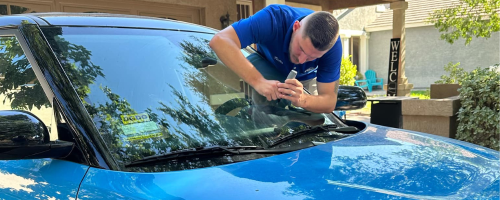This article delves into acoustic glass windshields, explaining their composition, the benefits they provide, and the features that set them apart from traditional windshields. By the end, you’ll be equipped with the knowledge to decide if an acoustic glass windshield is the right choice for your next car or a potential upgrade.
In today’s world, finding moments of peace can be challenging. Even within the seemingly contained environment of your car, the constant barrage of road noise can be disruptive and stressful. Acoustic glass windshields offer a technological leap forward in automotive comfort and tranquillity.
What is an Acoustic Glass Windshield?
An acoustic glass windshield, or a sonic laminated windshield, is a specially designed windshield that incorporates an additional layer to reduce noise transmission into the vehicle’s cabin. This innovative approach utilizes a thin, transparent PVB (polyvinyl butyral) interlayer sandwiched between two layers of standard automotive glass. This interlayer acts as a sound barrier, absorbing and dissipating noise from the outside environment. The result is a quieter and more comfortable driving experience for passengers inside the vehicle.
How Does an Acoustic Glass Windshield Work?
The magic behind acoustic glass windshields lies in the PVB interlayer. This layer acts as a sound barrier, dampening vibrations caused by external noise sources like traffic, wind, and road imperfections. When sound waves hit the windshield, the PVB layer absorbs some energy, reducing the overall noise level penetrating the cabin. Overall, using acoustic glass windshields helps create a more peaceful and enjoyable driving environment by minimizing unwanted external noise. This technology especially benefits those who prioritize a quiet and comfortable ride.
Benefits of Acoustic Glass Windshields
There are numerous advantages to opting for an acoustic glass windshield:
- Reduced Noise Levels: The primary benefit is the significant decrease in interior noise. Studies show that acoustic glass windshields can reduce noise levels by up to 6 decibels (dB) at specific frequencies and by 2 to 3 dB overall. This translates to a noticeably quieter and more peaceful driving experience.
- Improved Concentration and Focus: With less intrusive noise, drivers can concentrate better on the road and surrounding traffic, leading to potentially safer driving experiences.
- Enhanced Conversation Clarity: The quieter cabin allows easier conversation with passengers without raising your voice to compete with road noise. This is particularly beneficial for long journeys or rides with passengers who might have hearing difficulties.
- Reduced Driver Fatigue: Constant noise exposure can be tiring. Acoustic glass windshields can help reduce driver fatigue, especially on extended journeys, by dampening noise levels.
- Potential Fuel Efficiency Improvement: In some cases, the quieter cabin experience can lead to a more relaxed driving style, potentially contributing to slightly improved fuel efficiency.
The Acoustic Windshields market is projected to grow at a CAGR of 5.8% from 2018 to 2028.
Features of Acoustic Glass Windshield
While the core functionality remains the same, acoustic glass windshields can come with additional features:
- Multiple PVB Layer Options: Some manufacturers offer windshields with a double PVB interlayer for even greater noise reduction capabilities. Some acoustic glass windshields may also include UV protection to help protect the interior of the vehicle from sun damage. These features can enhance the overall driving experience and comfort for passengers.
- Integrated UV Protection: Many acoustic glass windshields incorporate a UV-blocking layer within the PVB interlayer, offering additional protection from harmful ultraviolet rays. This not only helps protect the interior of the vehicle from sun damage but also provides added safety for passengers by reducing their exposure to dangerous UV rays. Overall, these additional features can make a significant difference in the quality and comfort of the driving experience.
- Weight Considerations: Acoustic glass windshields can be slightly heavier than traditional windshields due to the additional PVB layer. However, technological advancements have minimized this difference, and the weight increase typically has minimal impact on vehicle performance.
Are Acoustic Glass Windshields Right for You?
Whether an acoustic glass windshield is the perfect fit depends on your driving habits and priorities. Here are some factors to consider:
- Noise Sensitivity: If you’re particularly bothered by road noise, an acoustic glass windshield can significantly improve your driving experience.
- Type of Driving: If you frequently commute in heavy traffic or travel long distances, the noise reduction benefits of an acoustic glass windshield become even more appealing.
- Vehicle Type: Luxury car manufacturers often include acoustic glass windshields as standard equipment, reflecting the focus on comfort and premium driving experience.
- Budget: While generally more expensive than traditional windshields, an acoustic glass windshield can be a worthwhile investment for many drivers.
Conclusion
Acoustic glass windshields represent a significant advancement in automotive technology, offering a quieter and more comfortable driving experience. Their ability to reduce noise levels inside the vehicle can greatly enhance the overall driving experience, making them a popular choice among luxury car manufacturers. Additionally, the long-term benefits of improved sound insulation and potential resale value may outweigh the initial higher cost for many drivers. By understanding their functionality, benefits, and features, you can decide whether this innovative windshield technology is the right fit for your car and driving needs. Remember, a quieter ride translates to a more relaxed, focused, and potentially safer journey for you and your passengers. Ultimately, the choice is yours to make.
FAQs
Q1: How much quieter are cars with acoustic glass windshields?
Studies show that acoustic glass windshields can reduce noise levels by up to 6 decibels (dB) at specific frequencies and by 2 to 3 dB overall. While seemingly small, a 3 dB reduction translates to a noticeable decrease in perceived noise levels.
Q2: Does acoustic glass affect windshield strength?
No, acoustic glass windshields maintain the same strength and safety as traditional windshields. They undergo rigorous testing to meet all impact resistance and occupant protection safety standards.
Q3: Do all new cars have acoustic glass windshields?
Not all new cars come equipped with acoustic glass windshields. It’s more common in luxury and higher-end vehicles where a focus is placed on comfort and a premium driving experience. However, some manufacturers offer them as an optional upgrade on select models.
Q4: Can I replace my existing windshield with an acoustic one?
You can replace your existing windshield with an acoustic glass windshield. However, the feasibility and cost will depend on your specific vehicle model and the availability of compatible aftermarket windshields. It is recommended that you consult a qualified auto glass technician.
Q5: Are there any downsides to acoustic glass windshields?
The primary downside is the slightly higher cost compared to traditional windshields. The added PVB layer can cause a minor weight increase, though advancements have minimized this impact.




























